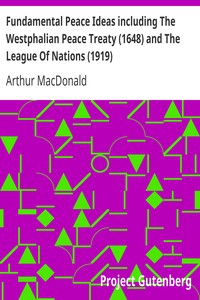Fundamental Peace Ideas including The Westphalian Peace Treaty (1648) and The…
"Fundamental Peace Ideas including The Westphalian Peace Treaty (1648) and The…" by Arthur Mac Donald is a scholarly treatise written in the early 20th century. This publication merges historical analysis with political theory, exploring both the Westphalian Peace Treaty, which ended the Thirty Years' War, and the League of Nations' efforts to promote international cooperation and peace. The book's likely topic revolves around the principles and psychological insights necessary for achieving lasting
peace between nations, drawing on the lessons learned from past conflicts. In this work, Mac Donald presents an anthropological analysis of the Thirty Years' War, highlighting its catastrophic consequences and the unique role the Westphalian Peace Treaty played in bringing an end to religious conflicts in Europe. He argues that the psychological understanding of the futility of war, which emerged from the exhaustion of both sides in this historical context, can inform contemporary peace efforts. By examining the challenges faced by the League of Nations, Mac Donald advocates for a renewed commitment to diplomacy and international governance, asserting that just as the Westphalian Treaty successfully established a framework for religious tolerance and coexistence, similar efforts are necessary to curtail political wars and foster a global culture of peace. (This is an automatically generated summary.)
Read or download for free
| How to read | Url | Size | |||
|---|---|---|---|---|---|
| Read now! | https://www.gutenberg.org/ebooks/35530.html.images | 96 kB | |||
| EPUB3 (E-readers incl. Send-to-Kindle) | https://www.gutenberg.org/ebooks/35530.epub3.images | 237 kB | |||
| EPUB (older E-readers) | https://www.gutenberg.org/ebooks/35530.epub.images | 236 kB | |||
| EPUB (no images, older E-readers) | https://www.gutenberg.org/ebooks/35530.epub.noimages | 96 kB | |||
| Kindle | https://www.gutenberg.org/ebooks/35530.kf8.images | 464 kB | |||
| older Kindles | https://www.gutenberg.org/ebooks/35530.kindle.images | 454 kB | |||
| Plain Text UTF-8 | https://www.gutenberg.org/ebooks/35530.txt.utf-8 | 86 kB | |||
| Download HTML (zip) | https://www.gutenberg.org/cache/epub/35530/pg35530-h.zip | 229 kB | |||
| There may be more files related to this item. | |||||
Similar Books
About this eBook
| Author | MacDonald, Arthur, 1856-1936 |
|---|---|
| LoC No. | 20026234 |
| Title |
Fundamental Peace Ideas including The Westphalian Peace Treaty (1648) and The League Of Nations (1919) in connection with International Psychology and Revolutions |
| Note | Reading ease score: 49.5 (College-level). Difficult to read. |
| Credits |
Produced by Jan-Fabian Humann and the Online Distributed Proofreading Team at https://www.pgdp.net (This file was produced from images generously made available by The Internet Archive/American Libraries.) |
| Language | English |
| LoC Class | JX: Political science: International law |
| LoC Class | D501: History: General and Eastern Hemisphere: World War I (1914-1918) |
| Subject | Peace |
| Subject | Peace of Westphalia (1648) |
| Category | Text |
| EBook-No. | 35530 |
| Release Date | Mar 8, 2011 |
| Most Recently Updated | Jan 7, 2021 |
| Copyright Status | Public domain in the USA. |
| Downloads | 110 downloads in the last 30 days. |
| Project Gutenberg eBooks are always free! | |

